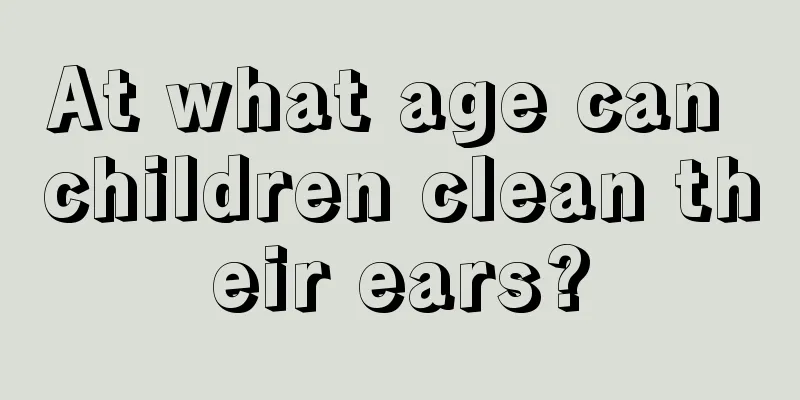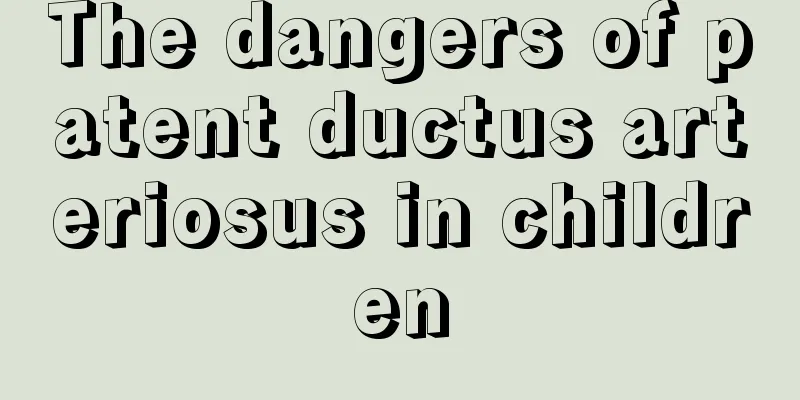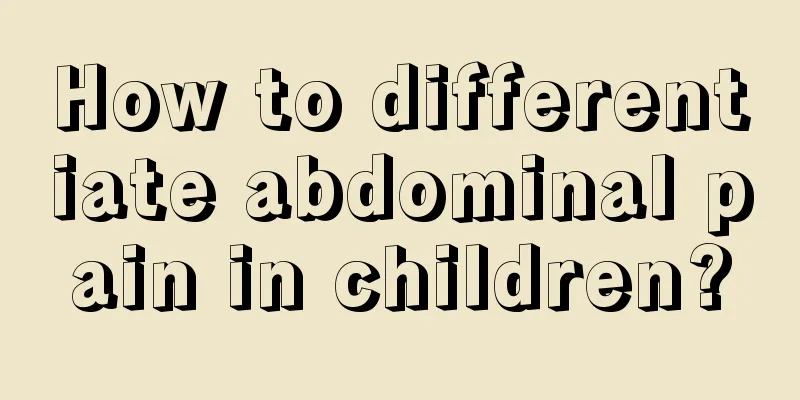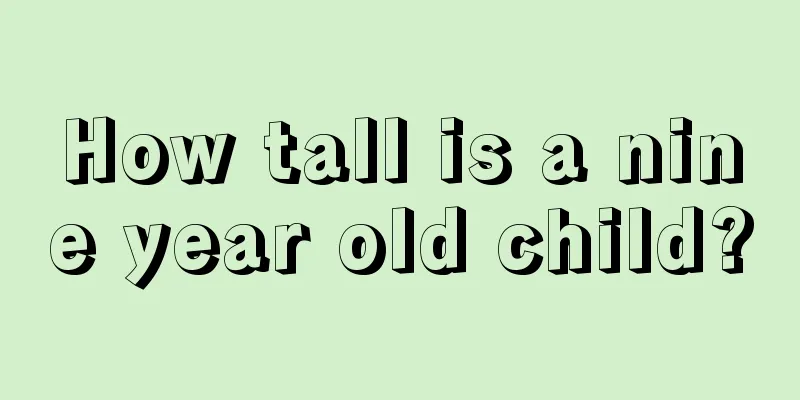At what age can children clean their ears?

|
Adults usually clean their ears every few days, otherwise their ears will be very uncomfortable. And ear cleaning is a very common phenomenon in life. Many parents want to clean their children's ears. In fact, it is generally not recommended to clean children's ears. The earwax in children's ears has a protective effect on the ears. So how old can children clean their ears? The following introduces how old children can clean their ears. How old can a child clean his ears? It is generally not recommended to Generally speaking, as long as the child's ears do not hurt or itch and his hearing is good, earwax does not need to be removed artificially. And earwax has certain functions. On the one hand, it is used to protect the eardrum. In fact, the eardrum is very thin, not to mention the baby's eardrum. The earwax covering it becomes a natural "protective film" that can help block strong sound impact. In addition, the baby's earwax and fine hair can absorb microorganisms and dust that enter the ear canal from the air, thus preventing bacterial infection of the eardrum. Another point is that everyone has experienced small flies harassing the ears. Earwax tastes bitter and is oily, so earwax can prevent small flies from flying into the baby's ears! It makes the insects afraid of earwax. Therefore, earwax is also a treasure to a certain extent, and it protects the baby's auditory organs, so mothers don't have to worry about their baby's earwax. How to clean baby's earwax You may ask, is there no adverse effect from excessive earwax accumulation? The answer is of course no. If there is too much earwax accumulated in the baby's ears, the earwax becomes dry and even fills the ear canal, and cannot be discharged by itself, it is entirely possible to have negative effects, such as impeding hearing, causing partial deafness, or inducing infection and tinnitus due to ear blockage. At this time, you can try the following method: The first step is to give your baby 1-2 drops of ear drops before he goes to bed. While the drops are being applied, you should have your baby lie in bed or hold him on your lap with his head turned sideways with the healthy ear at the bottom and the diseased ear at the top. After the medicine is dripped in, let the child maintain this position for 2 minutes to allow the earwax to be fully diluted. The second step is to put an earplug made of sterilized cotton ball into the baby's diseased ear. Remove the earplugs the next day. Earwax may stick to them and be removed from the ear canal. If the above methods don't work, then you should go to the hospital to seek medical help. The doctor will wear an otoscope to "reconnoiter" the baby's ears, estimate the amount of earwax and the degree of blockage in the ear canal, and then use a syringe to inject warm water into the baby's ears to flush out the earwax. The entire flushing process may make the baby feel a little uncomfortable, but it will not cause pain to the baby, nor will it hurt the baby's ear canal and eardrum. It is very safe. Many parents believe that baby's earwax is harmful to the baby, so they often use tools such as toothpicks, cotton swabs, ear spoons, etc. to remove baby's earwax, and they must remove it until it is clean. You might think there's nothing wrong with this. But do you know that frequently cleaning your baby's earwax is harmful to the baby's health?
If water gets into the child's ears, parents can use paper towels to absorb the water. That is, tear the paper towels into strips, place them in the child's ear canal and slowly absorb the water. Instead of using a cotton swab to dig inside, the water won't come out and the child's ear canal may be damaged. If the child says that he or she feels uncomfortable and must have the ear cleaned, parents must be very careful and only clean the surface areas that can be seen, and not enter the ear canal. If there is a foreign object in a child's ear, he or she needs to be taken to the ENT department for examination and help in time, rather than trying to dig it out by yourself. The deeper you dig, the more trouble you will get.
1. May cause hearing loss It is common for mothers to love cleanliness. They want every part of their baby's body to be clean, even the little ears. It is common to see mothers using cotton swabs or ear spoons to clean their children's ears. Child health experts remind mothers that cleaning children's ears may cause hearing loss at any time. Because children's ears are very fragile and their hearing is still developing, if they accidentally touch the ossicles or eardrum, it may cause the child's hearing loss and cause irreparable damage to the child's healthy growth. It is recommended that parents do not clean their children's ears at will. It is normal for children to have some dust and matter in their ear canals. Do not clean them out for fear of causing problems. 2. Or it may cause otitis media in children Cleaning your child's ears may cause otitis media at any time, especially when some mothers wash their children's ears with water before cleaning their ears. If water enters the ears and then the ears are cleaned with objects, the child's ear canal is very likely to be infected with bacteria and cause otitis media. The child suffers from otitis media and is in great pain. The parents see it and feel anxious, but it is too late to regret. Some parents always wonder why their children suffer from such strange diseases, but they don’t know that it is because they do not know how to care for and nurture their children. 3. Problems with external ear canal infection There may be no problem when parents clean their children's ears once or twice, but who can guarantee that there will be no problem the third or fourth time! Some children have external ear canal infections because their parents often clean their children's ears. Long-term cleaning increases the risk of ear canal infections, which is prone to infection and is not good for the healthy growth of children. It is best for parents not to clean their children's ears as it is bad for their hearing. |
<<: Can children use air conditioning?
>>: Is it okay to bathe newborns with mugwort water?
Recommend
What to do if your child vomits and has stomach pain
For parents, taking care of children is a very di...
Reasons why baby's head sweats
Sweating is a condition that many people experien...
What to do if your baby is stung by a wasp
Babies are usually very naughty and have great cu...
A few simple tips to make your baby love drinking water
Parents pay great attention to replenishing their...
What to do if your child is bitten by fleas
Fleas are small animals that are very annoying. I...
What to eat for children with sinusitis
Sinusitis is one of the common infectious disease...
What to do if your child has smelly feet? Treatment for children's smelly feet
In life, many children have the problem of smelly...
Causes of pain below the ribs in children
Children generally have low physical fitness, and...
What should I do if my child has a runny nose due to heat?
When seeing their children with a runny nose, mos...
Treatment for children who have trouble sleeping at night
In daily life, not only adults feel physically ti...
What are the advantages and disadvantages of children skipping rope?
Whether in kindergarten or in the community, wher...
Baby takes medicine and has green stool
For some babies, after taking medicine, some side...
Can children eat Panax notoginseng?
Panax notoginseng is the main tonic. It is also c...
How should appendicitis in children be treated?
Many children will have symptoms of appendicitis....
What happens after getting the chickenpox shot?
Because chickenpox is a widely contagious disease...









